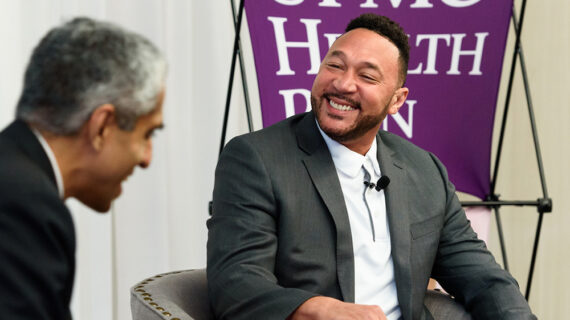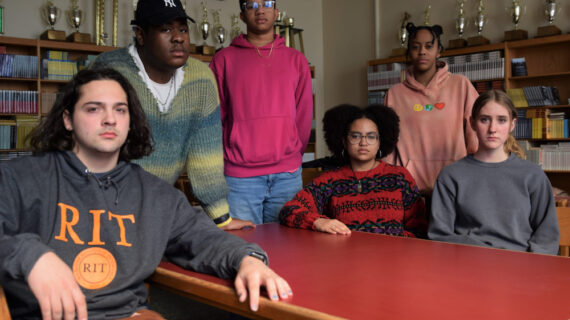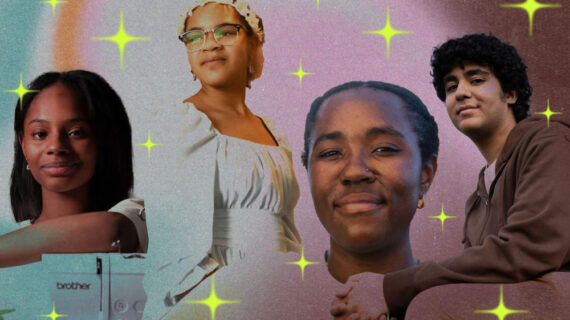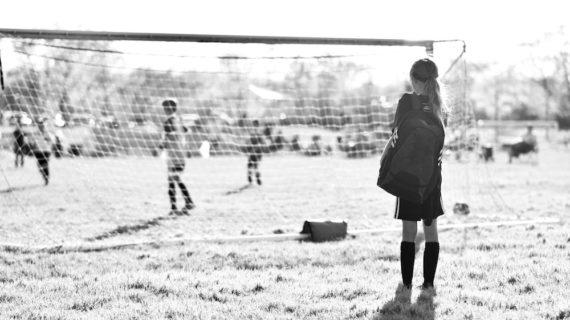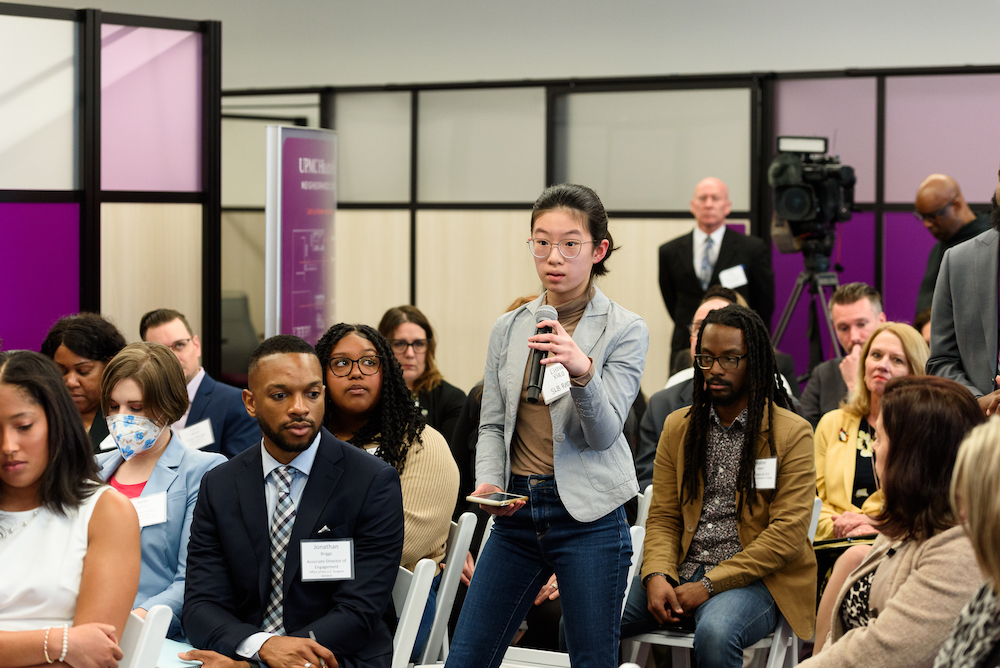
Pittsburgh teens are struggling. This advice from the U.S. Surgeon General could help.
This first-person news report was written by Elena Xiao, a 7th-grader at Ingomar Middle School who has been learning journalism skills at SLB Radio. Photos courtesy of UPMC Health Plan.
In her song “this is me trying,” Taylor Swift sings these words: “I was so ahead of the curve, the curve became a sphere…Fell behind on my classmates, and I ended up here… I just wanted you to know that this is me trying…”
These raw, honest lyrics have been resonating with high schoolers on Tiktok. Countless users tell stories of being burnt out from always competing for validation, until finally running out of the drive that kept them going for so long. There is always something to work for, always room for improvement.
These lyrics were on my mind as I listened to the U.S. Surgeon General, Dr. Vivek Murthy, during a recent “community conversation” event in East Liberty, hosted by UPMC Health Plan. Dr. Murthy spoke with retired Steeler Charlie Batch about young adults and the mental health pressures they face today.
Dr. Murthy understands that there is a unique set of factors influencing youth mental health today. “When I was growing up,” Murthy told the audience, “when you left school, you had some respite from the bullying. It’s not true for a lot of kids today.”
Technology is in our pockets and in our palms, he said, and it brings us so much negative information.
“What is often front and center in kids’ minds, and frankly the minds of adults,” Murthy said, “are all the tragedies – everything that’s broken about the world.”
I’ve seen my peers struggle with the feeling that everything is broken, and I’ve seen first-hand the pressure on teenagers who are trying to succeed in our complicated, fractured world. Right now I’m finishing 7th grade, but each day I see the stress my sister experiences as a high schooler.
High school students face “hustle culture,” the “rise and grind” mentality of continuously working for academic validation within peer competition. My sister, a junior, often talks about the stress she and her peers face from juggling Advanced Placement (AP) courses, challenging curriculum, athletics, extracurriculars, and college preparation while still trying to maintain an active social life. When she goes on social media, she finds her peers posting pastel images of beach vacations with friends while she is working on a sheet of calculus problems. This is often isolating, as it creates a feeling of everyone else having perfect, effortless lives and being an outlier.
But not everything is as it seems on social media. With filters and perfected curated feeds, we subconsciously compare ourselves to this selective view of someone else’s life.
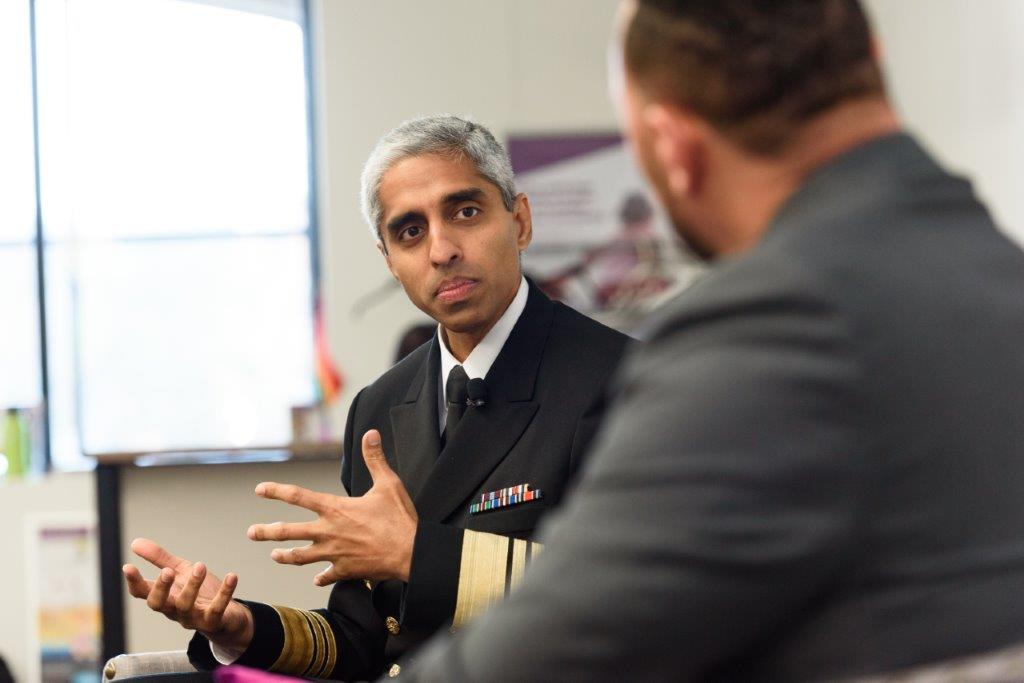
Dr. Murthy spoke about the self-comparison and feelings of loneliness sparked by social media, and how that affects almost half of high schoolers in America. If my sister or anyone I care about is affected, I want to be able to support them through this stressful and demanding stage of their life. How can I help them feel loved and understood?
I was able to ask Dr. Murthy himself. Here’s what he shared:
Choose to Unplug: He encourages us to take it offline, spending time without devices in the way. “This is where we have to come together and take collective action. So, if students can actually come together and say, ‘You know what? We’re just going to have an in-person hangout without any devices’, and you try that for a few weeks and see how it feels, I think it can get better.”
Reach Out and Connect in Person: Dr. Murthy encourages students to reach out to each other, so that they can create a supportive community to prevent feelings of loneliness caused by social media comparison. He said he’s been impressed seeing how resourceful high school and middle school students are as we build our own groups and programs to connect. We are stronger when we realize that everyone has moments of loneliness. “One of the most important things when you’re a young person at school struggling with loneliness,” he said, “is to realize that even though it seems like everyone is having a good time, even though they’re constantly posting pictures that make it seem like they’re ‘social’ constantly, or going to parties, hanging out with people, there are a lot of people struggling with loneliness.”
This conversation with the Surgeon General highlighted the growing awareness around youth mental health in the Pittsburgh community. I’m excited to see how these organizations can bring more awareness to the mental health obstacles that teens experience today.
Don’t let the curve become a sphere for our high schoolers who fear falling behind, strive for academic validation, and long for closer relationships. There are various ways that you can reach out to them, such as having conversations and doing activities without devices or encouraging the teens in your life to reach out to their peers. You can also find local organizations in the area that are working to support and help teens connect with others.
Teens want you to know that we are trying. We need your support and we need you to connect with us, now more than ever.
